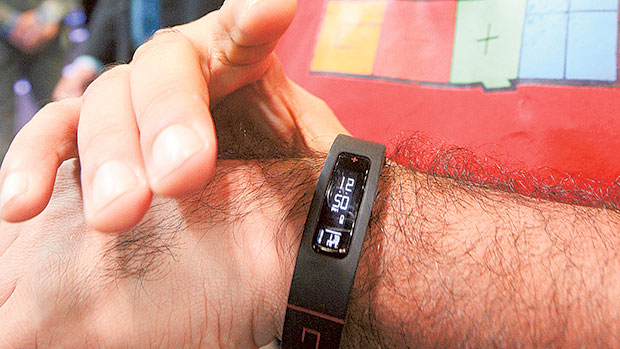
Dubai: Many companies have forayed into the fitness tracker space and many more are expected to follow. It is a big business as consumers are becoming health conscious.
While wearable devices like Fitbit and Jawbone Up tracks steps taken, calories burnt and number of hour slept, it only aims to improve the health.
All of the data are transmitted to the smartphone via an app.
“Fitness trackers are really not all that effective and it does not really work for some. I have used all the fitness bands available in the market. I have seen many people who have stopped using the device after few months,” Vishal Gondal, founder and CEO of GOQii, told Gulf News.
GOQii is a fitness band, like others, but it comes with a personal coach as well as a team of nutritionists and doctors who makes sense of the data and coaches you to make changes in consumers’ lifestyle to make them healthy and active. Users can chat with their coach for expert advice and comments.
Gondal is a well-known figure in India. He founded IndiaGames, India’s largest integrated game developer-publisher, in 1999 which was later acquired by Walt Disney for $100 million in 2011.
The biggest advantage of GOQii is that it is free and the company charges only for the personal coach.
He said the coach will interpret your data and encourage the users. They help users set goals, identify challenges and coach you to develop the habits needed to overcome your obstacles and reinforce your goals. The key to a sustained engagement is the collaboration between a user and a coach.
He said that users really don’t know what to do with the data. For example, how many steps or how many hours of sleep are adequate for a person. These are the things a coach can answer from the data collected.
According to research firm IHS Technology, the global market for sensors in wearables will grow to 466 million units in 2019, up from 67 million in 2013.
“Wearables are a hotbed for sensors, with market growth driven by the increasing number of these components in each product sold,” Jérémie Bouchaud, director and senior principal analyst, MEMS & Sensors, at IHS Technologym, said in a emailed statement.
Shipments of sensors will climb much more quickly than the market for the wearable devices themselves. Wearable devices will increase to 135 million units in 2019, less than three times the total of 50 million in 2013.
Bouchaud said the main factor propelling this phenomenon is a transition in market share away from simple products like pedometers and toward more sophisticated multipurpose devices such as smartwatches and smartglasses.
“Instead of using a single sensor like the simpler devices, the more complex products employ numerous components for health and activity monitoring, as well as for their more advanced user interfaces,” he said.
The average wearable device shipped in 2019 will incorporate 4.1 sensor elements, up from 1.4 in 2013.
The Menlo Park-based start-up launched its devices in India recently and is entering UAE now.
“We have announced an exclusive deal with Amazon.in in India. We have a few thousand customers now,” he said.
“We have raised a few million in angel funding from Google’s head of search Amit Singhal, Flextronics CEO Mike McNamara, EDventure’s Esther Dyson, Dubai-based entrepreneur Prashant K. Gulati, Seagate CEO Steve Luczo, Bollywood actress Madhuri Dixit and her husband Dr Sriram Madhav Nene, among others,” he said.
The company is looking for additional investment and is looking for investors from the region also, he said.
“We are in talks with etisalat and du for carrier business,” he said.
When asked how GOQii makes money by giving the device for free, he said the answer lies in outsourcing coaches for low prices from India.
He said the idea is not to make money from the hardware but to get the training done.
“The device is not the ecosystem. The ecosystem is your coach. We aim to charge Dh500 from customers for a six-month training period,” he said.
Our whole idea is wellness of the people and help them become more charitable. Users earn one karma point for every 390 steps and the earned points are given to charity of the users’ choice.












